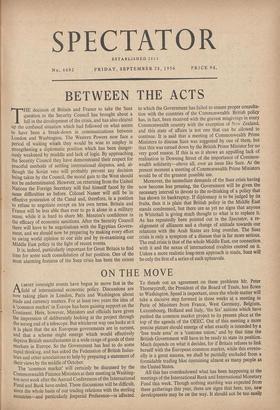BETWEEN THE ACTS
THE decision of Britain and France to take the Suez question to the Security Council has brought about a lull in the development of the crisis, and has also cleared up the confused situation which had followed on what seems to have been a break-down in communications between London and Washington. The Western Powers now face a period of waiting which they would be wise to employ in strengthening a diplomatic position which has been danger- ously weakened by muddle and lack of logic. By approaching the Security Council they have demonstrated their respect for Peaceful methods of settling international disputes, and, al- though the Soviet veto will probably prevent any decision being taken by the Council, the moral gain to the West should not be underestimated. However, on returning from the United Nations the Foreign Secretary will find himself faced by the same difficulties as before. Colonel Nasser will still be in effective possession of the Canal and, therefore, in a position to refuse to negotiate except on his own terms. Britain and France will be less able than ever to go it alone in a military sense, while it is hard to share Mr. Menzies's confidence in the efficacy of economic sanctions. After the Security Council there will have to be negotiations with the Egyptian Govern- ment, and we should now be preparing by making every effort to swing world opinion to our side and by re-examining our Middle East policy in the light of recent events.
It is, indeed, partibularly important for Great Britain to find time for some such consolidation of her position. One of the most alarming features of the Suez crisis has been the extent to which the Government has failed to ensure proper consulta- tion with the countries of the Commonwealth. British policy has, in fact, been received with the gravest misgivings in every Commonwealth country with the exception of Nt.‘■ Zealand, and this state of affairs is not one that can be allowed to continue. It is said that a meeting of Commonwealth Prime Ministers to discuss Suez was suggested by one of them, but that this was turned down by the British Prime Minister for no very good reason. If this is so it shows an appalling lack of realisation in Downing Street of the importance of Common- wealth solidarity—above all, over an issue like Suez. At the present moment a meeting of Commonwealth Prime Ministers would be of the greatest possible use.
Moreover, the immediate demands of the Suez crisis having now become less pressing, the Government will be given the necessary interval to devote to the re-thinking of a policy that has shown its bankruptcy. If diplomacy is to be judged by its fruits, then it is plain that British policy in the Middle East stands condemned, but there are as yet no signs that anyone in Whitehall is giving much thought to what is to replace it. As has repeatedly been pointed out in the Spectator, a re- alignment of alliances and a change of attitude towards our relations with the Arab States are long overdue. The Suez crisis is only a symptom of a disease that is far more serious. The real crisis is that of the whole Middle East, our connection with it and the nexus of international rivalries centred on it. Unless a more realistic long-term approach is made, Suez will be only the first of a series of such upheavals.


































 Previous page
Previous page